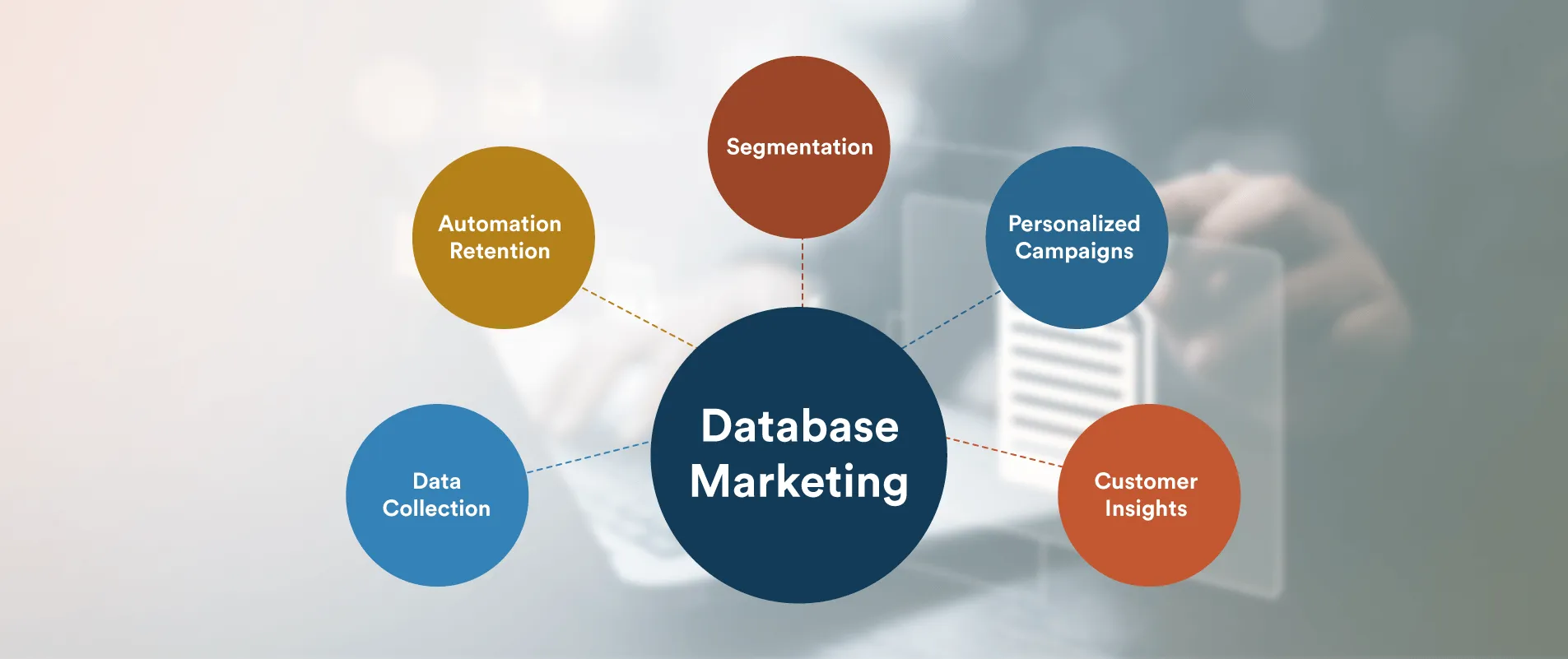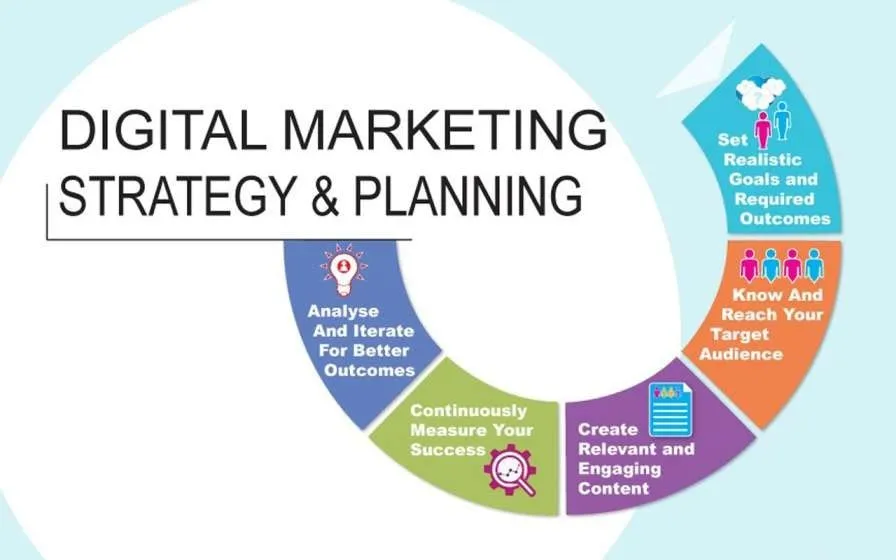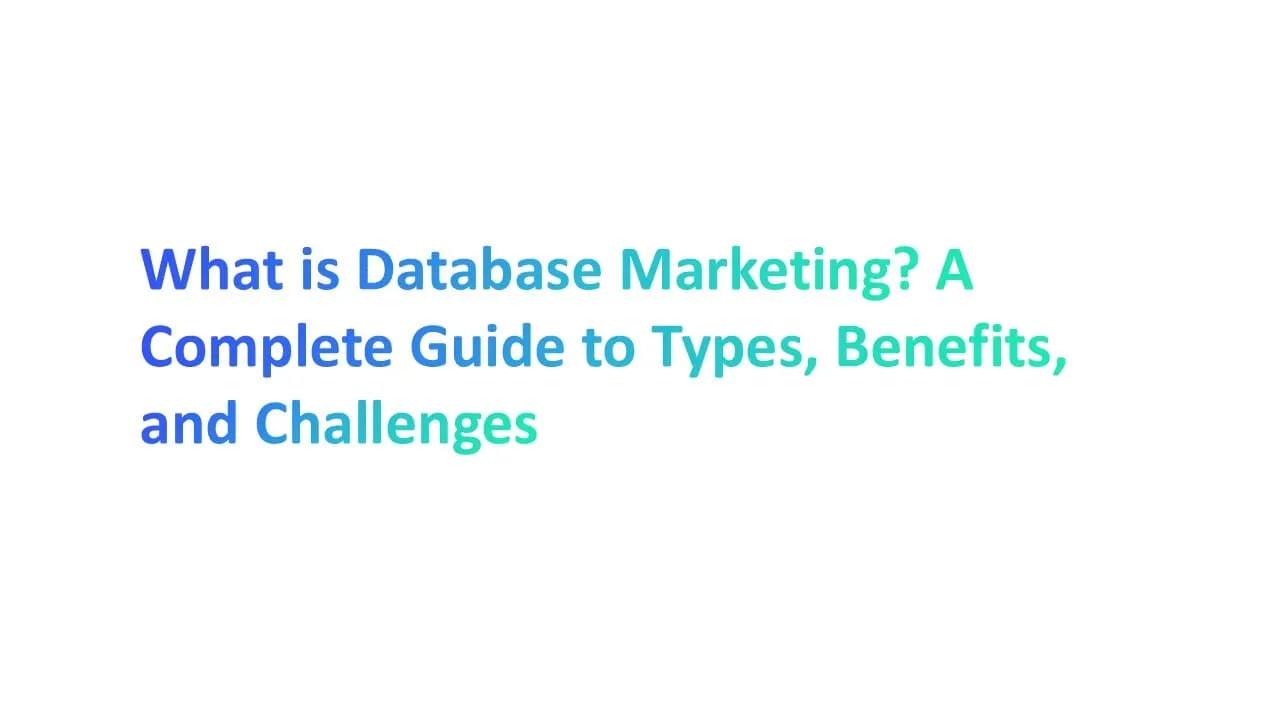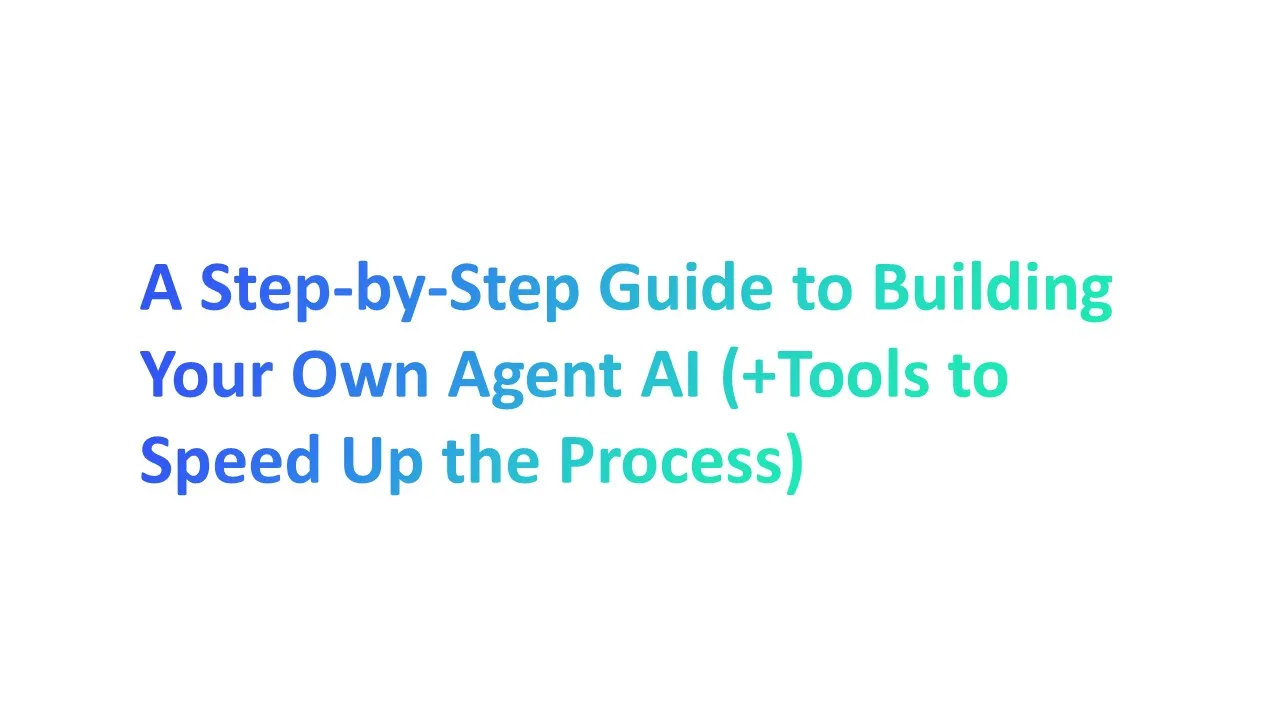Database marketing is all about using customer data to create targeted marketing campaigns that speak directly to the right audience. By collecting and analyzing valuable insights, businesses can leverage consumer data to understand their customers' behavior and preferences.
This approach helps companies build customer relationships, drive more effective marketing efforts, and improve their overall marketing strategy. In fact, studies show that personalized marketing campaigns can increase conversion rates by as much as 10% to 20%.
However, with data accuracy and maintaining data quality being top priorities, businesses must navigate challenges such as data decay and gathering customer data effectively to maximize results.
What is Database Marketing?

Database marketing involves using consumer database marketing techniques to create personalized marketing campaigns. It relies on customer information, such as demographic data, customer preferences, and transaction data, to analyze customer behavior.
By gathering customer data and consolidating it in business databases, companies can deliver personalized marketing messages to the right target audience.
It helps improve customer engagement, tailor marketing efforts, and create customer relationships based on data-driven insights.
How Does Database Marketing Work?

Database marketing works by gathering and analyzing customer data, such as demographic data, transaction data, and customer behavior, to create personalized marketing messages.
Companies use customer databases to store and consolidate rich customer data, allowing them to segment customers based on specific customer segments and consumer behavior.
Marketing teams then use this information to create targeted marketing campaigns that engage both existing customers and potential customers.
By identifying specific customer segments and leveraging customer data, businesses can improve customer engagement and tailor marketing efforts to deliver personalized experiences.
What Are the Different Types of Database Marketing?

To make database marketing more effective, businesses use different strategies to connect with customers. Below, we'll break down the three main types of database marketing:
1. Direct Marketing
Direct marketing is a strategy that focuses on communicating directly with existing customers and potential customers through personalized messages. Here’s how it works:
- Uses customer data to craft relevant, targeted messages
- Delivers personalized marketing messages through direct mail, email, or online ads
- Relies on consumer database marketing to ensure messages reach the right target audience
- Aims to increase customer engagement and drive conversions by sending tailored offers
Benefits of Direct Marketing:
- Direct communication with the audience
- More relevant content, improving engagement and response rates
- Drives conversions through well-targeted offers
2. Relationship Marketing
Relationship marketing focuses on building long-term customer loyalty by creating strong connections. Here's how it works:
- Centers around maintaining customer relationships over time
- Uses customer behavior and data analysis to provide tailored experiences
- Increases customer satisfaction by meeting individual needs through personalized support
- Encourages repeat business and retains existing customers
Benefits of Relationship Marketing:
- Helps retain existing customers and improve loyalty
- Strengthens brand-consumer connections
- Enhances customer engagement over time
3. Behavioral Targeting
Behavioral targeting uses data on customer behavior to create highly specific marketing messages. Here’s how it works:
- Analyzes user data segmentation like past purchases, online behavior, and interactions
- Delivers targeted marketing campaigns based on what the customer has shown interest in
- Provides personalized marketing messages based on customer habits
- Helps improve marketing efforts by using precise data to reach the right audience
Benefits of Behavioral Targeting:
- Creates highly personalized marketing campaigns
- Increases the relevance of ads to the target audience
- Optimizes marketing spend by focusing on high-intent customers
Each type of database marketing has its purpose, and businesses can use one or more of these strategies to enhance their marketing efforts. Direct marketing focuses on sending targeted messages to specific individuals. Relationship marketing builds loyalty and keeps customers engaged. Behavioral targeting ensures marketing campaigns are relevant and timely.
By using data collection, analyzing customer data, and leveraging customer data, businesses can improve their marketing strategy and effectively connect with their audience.
Why Is Leveraging Customer Data Important in Database Marketing?

Leveraging customer data allows businesses to create more targeted marketing campaigns by understanding customer preferences and behavior. By analyzing collected data, businesses can identify specific customer segments and craft personalized marketing messages that resonate with their audience.
This helps improve customer engagement and strengthens customer relationships. Data accuracy ensures that marketing efforts are not wasted, while rich customer data provides valuable insights into buying patterns.
By consolidating customer data, businesses can improve their marketing strategy and better tailor marketing efforts to meet the needs of their target audience.
What Are the Benefits of Database Marketing?

Database marketing offers numerous advantages for businesses aiming to connect with their customers in a more meaningful and personalized way.
By leveraging valuable customer data, businesses can enhance their marketing strategy and see tangible improvements across multiple areas.
1. Improved Customer Loyalty
One of the key benefits of database marketing is its ability to strengthen customer relationships. By using customer information, businesses can keep track of customer preferences and behaviors, allowing for the delivery of personalized experiences.
Customers feel valued when companies acknowledge their needs and preferences, which naturally leads to increased customer loyalty. As a result, businesses can retain existing customers more effectively and create a base of repeat customers who are more likely to engage with marketing campaigns.
2. Better Customer Targeting
With the help of data analysis and customer segmentation, businesses can fine-tune their marketing efforts. By understanding who the customers are, what they need, and how they behave, companies can design campaigns that are more likely to resonate with the right people.
This means marketing messages are targeted at specific customer segments, ensuring that the content they see is relevant. This not only improves engagement but also helps businesses avoid wasting resources on customers who are not the right fit.
3. Personalized Marketing Campaigns
Personalization is at the heart of database marketing. By analyzing collected data, companies can develop personalized marketing campaigns that cater to each individual’s preferences. Whether it's tailored promotions, product recommendations, or special offers, personalization makes customers feel understood and valued.
This personalized support fosters a stronger bond between the business and its customers, encouraging continued interaction and higher engagement rates.
4. Higher ROI and Revenue
Database marketing leads to more effective marketing campaigns that deliver measurable results. By using rich customer data and transaction data, businesses can optimize their marketing efforts, ensuring that every dollar spent on campaigns yields a higher return on investment (ROI).
Well-targeted campaigns reduce wastage and focus resources on high-potential customers, which can result in a significant boost to revenue. With accurate data driving decisions, businesses can spend their marketing budget more wisely and efficiently, leading to increased sales.
5. Enhanced Decision-Making
By analyzing customer behavior and consumer data, businesses can make informed decisions about future marketing strategies. With access to accurate data, companies can identify patterns, trends, and emerging opportunities.
This data accuracy ensures that decisions are based on reliable insights rather than assumptions, helping to avoid costly mistakes. Businesses can adapt their strategies in real time, offering more relevant products or services to their customers based on up-to-date information.
6. Cost-Effective Marketing
Database marketing helps companies cut costs by focusing on targeted marketing campaigns. Instead of spending money on broad, generic advertising, businesses can use data collection and user data segmentation to create more focused and effective campaigns.
This helps reduce the cost per acquisition and improves overall efficiency. By narrowing down the audience, businesses can allocate their marketing resources where they will have the most significant impact, thus saving money in the process.
7. Increased Customer Insights
One of the most valuable benefits of database marketing is the deeper understanding it provides of customer needs and behaviors. By constantly gathering customer data and analyzing it, businesses can gain valuable insights into what drives customer decisions, their pain points, and preferences.
This helps companies stay ahead of the competition by anticipating customer needs and delivering solutions before they are even asked for. The more information a business has, the better equipped they are to make informed decisions and stay relevant in the market.
Database marketing provides a comprehensive way to connect with customers, improve targeting, and achieve better results. It helps businesses enhance customer loyalty, create highly personalized marketing messages, and ensure that marketing spend is directed towards the right audience, resulting in higher ROI and better overall business outcomes.
By improving decision-making and gaining deeper customer insights, businesses can build lasting relationships and remain competitive in their industry.
Key Steps to Implement Database Marketing Strategy Successfully

To implement a successful database marketing strategy, you need to follow a few critical steps that ensure the data is used effectively to reach the right audience. Here’s a breakdown of the key steps to implement database marketing:
1. Define Clear Objectives
Before diving into database marketing, it's essential to define what you want to achieve. Clear goals provide direction and ensure that your efforts are aligned with your overall marketing strategy. Whether you're aiming to increase customer engagement, enhance targeted marketing campaigns, or improve customer relationships, having well-defined objectives helps focus your efforts.
- Set specific, measurable goals for customer acquisition, engagement, or retention.
- Ensure alignment between marketing objectives and business outcomes.
- Establish KPIs to measure success effectively.
2. Collect and Organize Customer Data
The foundation of any database marketing strategy is the data itself. To gain valuable insights, it's crucial to gather and organize customer data. Proper data collection allows you to understand customer behavior, preferences, and purchase patterns, making it easier to tailor your marketing efforts.
- Use marketing databases to store and categorize customer information.
- Implement data collection methods that capture relevant details like transaction data, demographic data, and consumer behavior.
- Ensure that the data is accurate and regularly updated to maintain its relevance and effectiveness.
3. Segment Your Customer Base
Once you've gathered the necessary data, it's time to segment your customer base. This step helps you group customers based on shared characteristics, enabling you to send more relevant and personalized messages. Segmenting allows for a more focused and effective marketing approach.
- Use customer segmentation to divide your customers based on factors such as age, interests, or purchasing habits.
- Identify specific customer segments that will benefit from personalized campaigns.
- Focus on tailoring content for each segment, whether it's for existing customers or potential customers.
4. Choose the Right Marketing Tools
Choosing the right marketing tools is essential to execute your database marketing strategy effectively. Tools like marketing automation tools and marketing resources help streamline your campaigns and ensure that the right messages reach the right customers at the right time.
- Use marketing automation tools to automate email campaigns, track engagement, and analyze results.
- Choose tools that integrate with your existing CRM system to maintain smooth data flow.
- Look for platforms that allow personalized marketing messages and targeted outreach.
5. Develop Personalized Campaigns
Personalization is key in database marketing. Once you have segmented your audience and chosen the right tools, it's time to develop personalized marketing campaigns. Customizing your content helps drive higher engagement and fosters stronger connections with your audience.
- Leverage consumer data and rich customer data to tailor content specifically to each customer segment.
- Create personalized marketing messages based on customer preferences, behaviors, and past interactions.
- Use insights from user data segmentation to refine your campaigns and improve relevance.
6. Track and Analyze Results
Tracking and analyzing your results is crucial to understanding the success of your marketing campaigns. By reviewing the performance of your campaigns, you can identify what's working and what needs improvement. This helps optimize future campaigns and refine your overall approach.
- Use data analysis to track key metrics such as engagement, conversion rates, and ROI.
- Regularly monitor customer engagement to ensure your campaigns are resonating with your audience.
- Adjust your strategy based on the insights gained from analyzing customer data and feedback.
7. Ensure Data Privacy and Security
Maintaining data quality and data privacy is essential in database marketing. With increasing concerns about security and data breaches, ensuring that customer data is protected builds trust and ensures compliance with regulations.
- Implement robust security measures to protect customer data and maintain privacy.
- Use encryption and secure systems to store sensitive information.
- Ensure compliance with privacy regulations such as GDPR to avoid legal issues.
By following these seven steps, defining objectives, collecting data, segmenting your audience, choosing the right tools, creating personalized campaigns, tracking results, and ensuring data security, you can successfully implement a business database marketing strategy that drives better customer relationships and delivers meaningful results.
What Are the Challenges in Business Database Marketing?

While business database marketing offers many advantages, it also comes with challenges that can affect efficiency and accuracy. Below are some of the key obstacles businesses face and how they can address them effectively.
1. Data Privacy and Compliance Risks
With increasing regulations around data protection, businesses must ensure they collect, store, and use customer information responsibly. Failing to comply with privacy laws can lead to penalties and damage customer trust. Companies need to be transparent about how they use customer data while keeping it secure from breaches.
Solution:
- Stay updated on data protection laws such as GDPR and CCPA.
- Implement strict security protocols, including encryption and access control.
- Inform customers about data usage and give them control over their information.
- Regularly audit data security practices to prevent vulnerabilities.
2. Maintaining Data Accuracy
Incorrect, outdated, or incomplete data can lead to ineffective marketing efforts. If customer records are not up to date, businesses risk sending irrelevant messages, leading to lower engagement and wasted resources.
Solution:
- Regularly clean and update customer records.
- Use automated tools to validate and verify data.
- Encourage customers to update their information through self-service portals.
- Set data entry standards to minimize errors during collection.
3. Integration with Existing Systems
Many businesses use multiple platforms for sales, marketing, and customer service. If these systems do not communicate properly, data silos can form, making it difficult to get a complete view of customer interactions.
Solution:
- Choose marketing platforms that integrate easily with existing CRM and sales tools.
- Use APIs to connect different systems and ensure smooth data sharing.
- Train teams to use integrated platforms effectively.
- Conduct regular system checks to fix integration issues early.
4. Managing Large Data Sets
As businesses grow, they collect vast amounts of customer information. Without proper organization, large data sets become difficult to manage, leading to inefficiencies and slower decision-making.
Solution:
- Use cloud-based storage to handle large volumes of data efficiently.
- Implement structured data categorization methods.
- Automate data sorting and analysis to improve accessibility.
- Regularly review and remove redundant or outdated data.
5. Handling Customer Data Overload
Too much data without clear insights can be just as problematic as too little data. Businesses must focus on extracting meaningful patterns rather than accumulating excessive information.
Solution:
- Focus on collecting only relevant data that aligns with marketing goals.
- Use AI-driven tools to analyze customer data effectively.
- Set clear guidelines for data collection to avoid unnecessary clutter.
- Prioritize actionable insights rather than gathering excessive information.
By addressing these challenges with the right strategies, businesses can improve the efficiency and accuracy of their database marketing efforts while maintaining strong customer relationships.
Conclusion
Database marketing helps businesses connect with customers in a more meaningful way by using data to create personalized and targeted campaigns. When done right, it improves customer relationships, increases engagement, and makes marketing efforts more efficient.
However, businesses must also handle challenges like data accuracy, privacy concerns, and system integration. By focusing on smart data management and security, companies can make the most of their marketing strategies.
The key is to use data responsibly, adapt to customer needs, and continuously refine marketing approaches for better results.







.webp)
